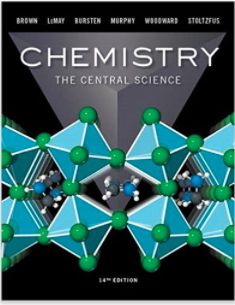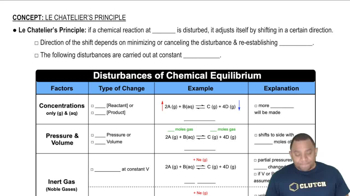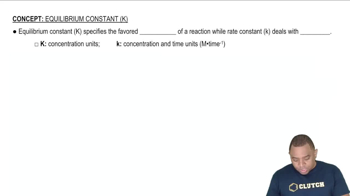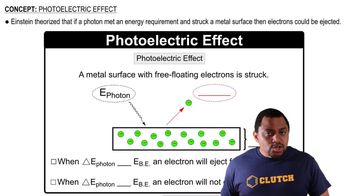At 25°C, the reaction CaCrO4(𝑠) ⇌ Ca2+(𝑎𝑞) + CrO42−(𝑎𝑞) has an equilibrium constant 𝐾𝑐 = 7.1×10−4. What are the equilibrium concentrations of Ca2+ and CrO42− in a saturated solution of CaCrO4?
Ch.15 - Chemical Equilibrium

Brown14th EditionChemistry: The Central ScienceISBN: 9780134414232Not the one you use?Change textbook
Chapter 15, Problem 61e
Consider the following equilibrium, for which Δ𝐻<0
2 SO2(𝑔) + O2(𝑔) ⇌ 2 SO3(𝑔)
(e) the total pressure of the system is increased by adding a noble gas
 Verified step by step guidance
Verified step by step guidance1
Identify the equilibrium reaction: 2 SO2(g) + O2(g) ⇌ 2 SO3(g). Note that ΔH < 0 indicates the reaction is exothermic.
Understand the effect of adding a noble gas: Adding a noble gas at constant volume increases the total pressure but does not change the partial pressures of the reactants and products.
Apply Le Chatelier's Principle: Since the partial pressures remain unchanged, the position of equilibrium is not affected by the addition of a noble gas at constant volume.
Consider the effect of pressure changes: If the pressure change were due to a change in volume, the equilibrium would shift towards the side with fewer moles of gas. However, in this case, the addition of a noble gas does not affect the equilibrium position.
Conclude the analysis: The addition of a noble gas at constant volume does not shift the equilibrium position of the reaction 2 SO2(g) + O2(g) ⇌ 2 SO3(g).

Verified video answer for a similar problem:
This video solution was recommended by our tutors as helpful for the problem above.
Video duration:
1mWas this helpful?
Key Concepts
Here are the essential concepts you must grasp in order to answer the question correctly.
Le Chatelier's Principle
Le Chatelier's Principle states that if a dynamic equilibrium is disturbed by changing the conditions, the system will adjust to counteract the change and restore a new equilibrium. In the context of the given reaction, increasing the total pressure by adding a noble gas does not shift the equilibrium position because the noble gas does not react with the components of the equilibrium.
Recommended video:
Guided course

Le Chatelier's Principle
Equilibrium Constant (K)
The equilibrium constant (K) is a numerical value that expresses the ratio of the concentrations of products to reactants at equilibrium for a given reaction at a specific temperature. For the reaction provided, K is determined by the concentrations of SO3 and the reactants SO2 and O2. Changes in pressure or concentration can affect the position of equilibrium but not the value of K unless temperature changes.
Recommended video:
Guided course

Equilibrium Constant K
Effect of Inert Gases on Equilibrium
Inert gases, such as noble gases, do not participate in chemical reactions and do not affect the concentrations of the reactants or products in a chemical equilibrium. When an inert gas is added to a system at constant volume, it increases the total pressure but does not change the partial pressures of the reacting gases, thus having no effect on the position of equilibrium.
Recommended video:
Guided course

Photoelectric Effect
Related Practice
Textbook Question
Textbook Question
Consider the following equilibrium, for which Δ𝐻<0
2 SO2(𝑔) + O2(𝑔) ⇌ 2 SO3(𝑔)
(f) How will each of the following changes affect an equilibrium mixture of the three gases: SO3(𝑔) is removed from the system?
Textbook Question
Consider the reaction 4 NH3(𝑔) + 5 O2(𝑔) ⇌ 4 NO(𝑔) + 6 H2O(𝑔), Δ𝐻 = −904.4 kJ Does each of the following increase, decrease, or leave unchanged the yield of NO at equilibrium? (a) increase [NH3] (b) increase [H2O] (c) decrease [O2]
Textbook Question
Consider the reaction 4 NH3(𝑔) + 5 O2(𝑔) ⇌ 4 NO(𝑔) + 6 H2O(𝑔), Δ𝐻 = −904.4 kJ Does each of the following increase, decrease, or leave unchanged the yield of NO at equilibrium? (d) decrease the volume of the container in which the reaction occurs
